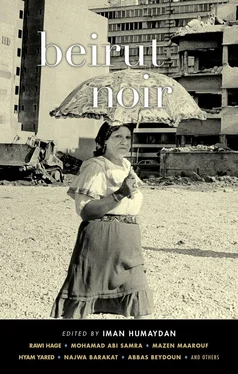The streets of Beirut were thunderstruck by a sudden fear, haunted by passing ghosts who disappeared as fugitives a few moments before. Its asphalt seemed somber, vibrating like metal under the screeching of our speeding car’s tires, a long, extended thrust into the terrifying daytime silence. As far as I could see, a spectacle of buildings almost devoured us, declining and drifting away, as though they were collapsing in silence and vanishing behind us. Suddenly, my driver closed the car window and burst out screaming. She careened forward, reeling between the two sides of the street before crashing a front wheel against the curb. A new explosion stopped my friend’s hysterical screaming, causing her to hunch over the steering wheel, which she hugged with her arms. When she lifted her head after a few moments, I told her that my parents’ house was nearby and we could go spend the night there.
In the dark light of my room, in front of the mirror on my wardrobe, I put the long black dress forgotten in my closet since my mother’s funeral on my naked body. A clear, sudden flash of that captivating fragrance blows over my senses, and blurry images of my colleague and I in my parents’ house in Beirut are reflected in my imagination. In a large mirror on the walls of my room in the old house, a vision of my colleague removing her long black dress, then putting on one of my housedresses. My skin shivers tautly under the cloth of my dress, and I lift it off my thighs and pass two strange hands over them, as if I’m passing them over my colleague’s thighs. Like a phantom from drawings I sketched during my innocent isolation in my Beirut adolescence, departing her body, her cold skin revealing thin, symmetrical bones. Irritation from my old housedress on that skinny body snuck onto my skin, on the days when I drew myself all naked and stretched out on the white sheets of my bed. I approached the mirror on my wardrobe, eyes closed. I kissed myself on the lips and listened to the echoes of my lust-filled gasps for air, from which a remote voice pronounces my name.
I try in vain to remember my colleague’s name. Its letters are scattered, remote, and don’t come together on my tongue. This smooth gap in my memory pulls me backward and makes me take a few steps away from the mirror on my wardrobe; I notice in its depths a blurry vision of our naked embrace. The taste of her scent in my mouth. I take the straps of my dress off my shoulders, and its cloth slowly falls from my chest and bends over at the top of my round butt. It’s as if my hands, without me, touched the pleats of the cloth, pushing it to the ground so that it piled up around my feet. Two moist lips kiss my belly button, and I bend down to embrace the woman’s head, my fingers playing with her short, boyish hair. With two thin arms she hugs my thighs and she passes her rough tongue, anointed with saliva, slowly over my skin. I’m intoxicated all the way to the roots of the hair growing out of my head. I open my eyes and hear myself repeating my colleague’s name. Cold little drops of sweat drip from under my arm, and from the strip of kisses between my breasts they descend toward my side. I bend down, pick up my dress from the floor, and a dizziness burns in me.
The light is strong on the surface of the mirror around my body. Suddenly, I remember the face of my friend and colleague and her rosy, puffy cheeks, a colored hijab tied tight around her hair, the top of her forehead, and her neck presenting itself as a stranger to her body and self. I remember her in a scene that took place in front of a mirror in my parents’ house, practicing with laughter to put on the hijab and tie its edges around her face, while informing me that the director of the art institute had spoken to her about wearing it and his desire to marry her secretly. They’d be married by a shaykh he knew, rent an apartment in Beirut for their secret life, and he’d appoint her a full-time professor at the institute.
Before this, when he first approached her, we spent evenings at my parents’ house laughing and talking about him and his behavior. She told me that once she took him out in her car on Beirut’s seaside Corniche, and with his outstretched hand and thick, short, trembling fingers he started skimming and touching the cloth of her dress. The image of a man’s hand creeping up toward a woman’s thigh under the cloth of her dress in a car aroused me, and I asked my friend what she did at that moment. She told me that she turned to her side and saw an impassive bald head, belonging to a man who’d let his blind, detached hand approach her dress and leg, both of which she felt were detached from her. The idea of a blind hand and its movement detached from a man’s body, together with a bald head stationary like a stone sculpture, with its suppressed, fearful desires, suggested to me that I had found the necessary shades and features to complete the canvas that I had started painting.
In that vast living room with its high ceiling, I turned to my friend who was stretched out on an old sofa. I loved the sight of her in an open bathrobe, revealing her long, thin legs. I came close to her, started running my hand slowly over the blond fluff of her legs, and felt a slight trembling in her skin, a little rough to the touch under my hand. She didn’t turn to me and she didn’t look at my hand. It was as if she were submitting to a distraction that completely detached her from her body and her presence at my side. To bring her back from her reverie, I observed that the toupee on the director’s head would take fifteen years off of his life — that was the age difference between the two of them — and that her secret marriage to him would add fifteen years to her life, so they would be the same and could produce secret children.
My friend laughed and got up from the chaise longue, saying, “All male children, I will bear twins after twins, and not like the four female children that his cousin my co-wife bore for him in his village in the south where they live in his parents’ house.” I was hearing the word co-wife for the first time and I imagined an old blind woman in a painting of the Greek countryside.
But I followed my friend’s words and thoughts, telling her, “You’ll visit her there and help her go on a diet. With his fake hair and marriage to you, the director will rekindle his desire for her and not divorce her. He might also regain his Communist commitment from the days when he was a school teacher in the village, before he left the Party and travelled to France to get a doctorate in philosophy, which led to his appointment as director of the Art Institute.”
After a while my friend told me that she invited him to dinner at a seaside restaurant and he told her that in his doctoral dissertation he had analyzed manifestations of the Nietzschean philosophy of power in the personality in Imam Ali ibn Abi Talib’s book Nahj al-Balagha , or The Way of Eloquence , and in Imam Khomeini’s school of Islam. After the two of them had left the restaurant, my friend continued, he dared to put his hand on her thigh where her dress was pulled back, as she was driving the car. I laughed, telling her that he was remembering the revolution of power in his dissertation, but just as quickly she shouted, “No, no... he wasn’t remembering anything!” Then she laughed, saying that he asked her to end her relationship with me because I was an Armenian slut. Suddenly, I begged her to bring him to my place one evening. She liked the idea and I realized that she — with no explanation — had already intuited what I was thinking. We would agree on the nature of the evening and its purpose, even down to the implications of her conditions — that she would leave us alone at home, the director and me, and she would depart at the end of the night.
Читать дальше












